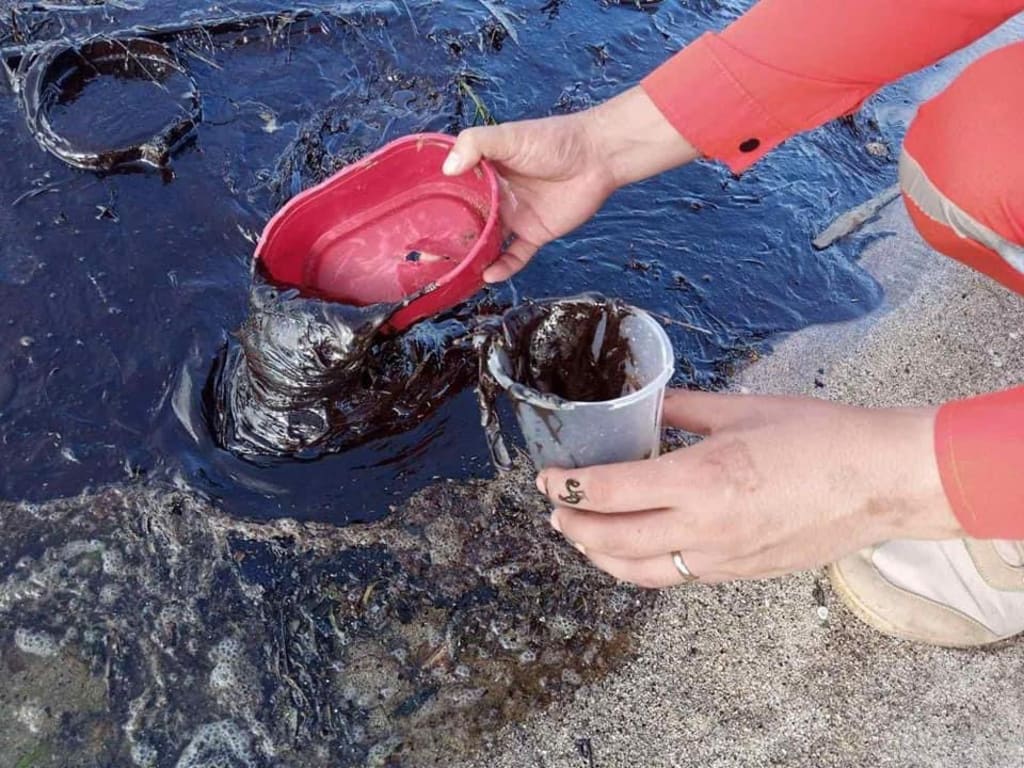Oil Clear? The Oil Spill Crisis in Oriental Mindoro, Philippines - Coast Guard and Local Government Unit Terminate Response Efforts
The Philippine Coast Guard and the local government unit of Oriental Mindoro have officially terminated the oil spill response, but is that enough?

On February 28, 2023, the coastal municipality of Naujan, Oriental Mindoro, Philippines woke up to a tragic sight - toxic sludge had been dumped along their coastline. The MT Princess Empress had encountered engine trouble and sank the day before, resulting in an estimated 800,000 liters of industrial fuel oil spilling across the ocean. This disastrous incident further damaged the already vulnerable marine ecosystem and the surrounding flora and fauna. As the crisis approaches the six-month mark, the Philippine Coast Guard (PCG) and the local government unit, led by Incident Commander Geronimo B. Tuvilla and Oriental Mindoro Governor Humerlito ‘Bonz’ Dolor, respectively, have formally signed The Joint Resolution for the Termination of the Oil Spill Response in Oriental Mindoro between the Provincial Government, national and local agencies, and private organizations on August 2. Although the government commits to continued support for affected individuals, it raises concerns about the long-term environmental implications and the need to address fossil fuel dependence for a sustainable future.
The situation remains murky
Back on March 30, the Department of Environment and Natural Resources (DENR) reported that 5,185 hectares of marine habitat were affected, resulting in approximately Php 7 Billion (almost $126M) in environmental damages. The coral reefs, mangroves, and seagrass in Occidental Mindoro, Oriental Mindoro, Palawan, and Antique provinces have suffered significant harm.
In mid-April, the National Risk Reduction Management Council (NDRRMC) revealed that a staggering 193,436 residents across three regions were adversely affected by the spill.
However, conflicting reports cloud the actual status of the cleanup efforts. By May 10, the Palace, the official residence of the President, declared that 84% of the coastline affected by the spill had been cleared. This statement contradicted the internal assessment of the most affected towns, specifically Pola. On July 19, Jonathan L. Mayuga of Business Mirror PH reported that Mayor Jennifer Cruz, in a hybrid news conference dubbed "State of the Oil Spill," asserted that Pola was only about 50% cleared of oil and oil residue. As of July, two months after the Palace's optimistic announcement, the fisherfolk in Pola were still unable to resume their livelihoods. The Mayor further declined to sign a document claiming 100% clearance until their town was genuinely free of oil and oil residues, even when requested by the Philippine Coast Guard.
The long-term effects of oil spills are severe and far-reaching
The insights from WWF Philippines echo Pola's internal assessment. The 2006 Guimaras Oil Spill had devastating consequences for people, ecosystems, and other species. Reportedly, 20,000 fishers across the islands of Panay, Guimaras, and Negros lost income linked to 1,143 hectares of marine reserves spoiled, with a total of 648.98 hectares of mangrove forests affected, and 0.93 hectares of mangrove dead three months after the spill. Mean seagrass reportedly declined from 28.2% to 15% after two years. Despite months of clean-up efforts and the Philippine Coast Guard's (PCG) persistence in declaring 100% clearance, it is deeply concerning that the clean-up is now terminated, especially when certain towns are evidently still not cleared of oil.
The health impact of fossil fuels cannot be ignored either. While they were once integral to the industrial revolution, it is now time to fast-track our shift to renewable energy and sustainability. The immediate impact of oil spills is costly, and the thriving ecosystems suffer instant death due to the toxic sludge. Beyond the environmental damage, the socio-economic impact is staggering, with residents claiming it to be worse than COVID. Moreover, marine biodiversity and surrounding ecosystems suffer immeasurable losses. As if that were not enough, the health of humans is at risk, as emissions from burning fossil fuels already lead to various respiratory illnesses and premature deaths, and direct exposure to toxic sludge could exacerbate the situation.
Moving Forward
Moving forward, it is evident that the continued dependence on fossil fuels poses significant threats to our planet and all its inhabitants. The devastating consequences are evident through the burning forests, intensifying typhoons, extreme heatwaves, melting ice caps, and prolonged pandemics that afflict our world. The recent oil spill in a region without the means to adequately clean it up serves as a harsh reminder that while the privileged few may overlook the realities they have caused, those residing in the affected areas bear the brunt of the climate crisis.
Rising above short-term interests and prioritizing the long-term health of our planet is the only way we can move forward to a brighter, greener, and more sustainable future. The alternative is unliveable.
Sources: Business Mirror PH ; CNN Philippines Department of Environment and Natural Resources ; Harvard School of Public Health; Oxfam; Philippine Daily Inquirer; Philippine Information Agency; Philippine News Agency; WWF Philippines
About the Creator
Karina Thyra
Fangirl of sorts.
Twitter: @ArianaGsparks






Comments
There are no comments for this story
Be the first to respond and start the conversation.